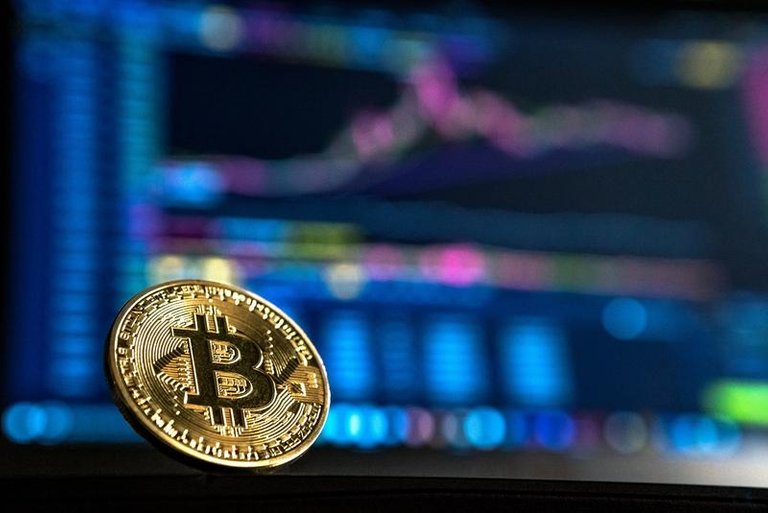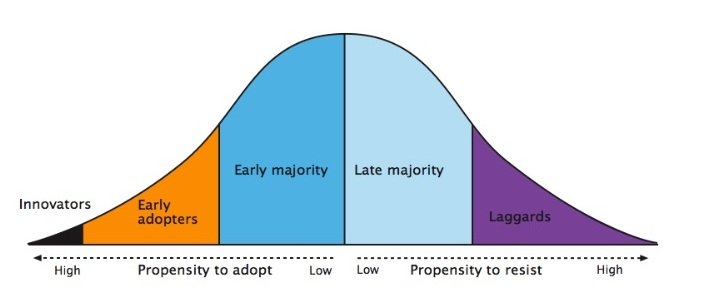
It Starts With An Idea...
There are many different things to do in the cryptocurrency space. The area of crypto that most will exist on is that of the Investor. We're all investors of some sort, especially on this site. However, there's a smaller group who will be responsible for the growth of this market for years and if you commit now, you are positioning yourself for great things if you follow through and actually build something people will like.
The demand for blockchain developers is going to increase dramatically as more companies begin adopting blockchain tech. They will need to outsource jobs remotely or bring in an expensive developer to their brick-and-mortar site and employ them full-time. Much like how the talent pool for artificial intelligence engineers doesn't meet the demand for them in major tech companies, the same is true for blockchain developers.
Then we also have to remember that each of these smart contract platforms such as EOS, Waves, Tron, NEO, and a ton more will all need developers to expand their platforms. Think about the potential to plant your flag on any of these crypto platforms! The wealth potential is huge for any serious developer, both independent and employed.
What is a Blockchain Developer?
A blockchain developer, much like with web developers, can go down a multitude of paths. Do you want to build on a platform that already exists, or do you want to try to build your own? These are important questions to ask because it'll dictate what you'll want to focus on. First and foremost, a blockchain developer is a type of software engineer/developer who can design, build, maintain, test and evaluate programs and applications on a blockchain. Whether they build the blockchain temselves or use a pre-built blockchain such as Ethereum or EOS.
Though, I'd say anyone building a blockchain architecture is more of an engineer than simply a developer. So I'd call that person a blockchain engineer, but I may be getting too much into semantics here.
I think the most important thing starting out is to understand the basics of blockchain technology. You'd be surprised how many people invest in cryptocurrencies and don't know what a hash number, hash rate, or SHA-256 are. There are great resources online through Udemy and elsewhere that can get you started on the basics (what I've linked to is by no means the extent of all that's on the web). There are also a variety of good books as well. I think any self-taught education online should also be used in companion with books. That's just my personal opinion though. I just find books very useful.
There is nothing wrong with everyday investors lacking in technical knowledge about blockchain, as the barrier of entry is low enough to allow people to participate without needing to know the details of how the system works. They just want to know that it works and that there are people who know what they're doing when these coins and tokens are built. If you're going to become a developer, you'll at least want an understanding of how the technology works on the back-end. You should strive to know it deeper than the majority of the people who are in the crypto space purely as investors.
Could Smart Contract Engineering Become a Massive Sub-Field Within the Blockchain Developer space?

Let's say you don't want to build your own blockchain. Many crypto platforms allow you to create your own assets on their systems and build on a pre-built blockchain using what are known as smart contracts. A project that I have mentioned several times already that I like is EOS. EOS will have arguably the best smart contract architecture on any mainnet that has launched thus far.
Smart contracts are what I am personally going to be focused on. You will certainly want to become familiar with object-oriented programming and I'd suggest starting out with a language like C++. There are other languages however such as Solidity on the Ethereum network which are also important to know if you want to build on Ethereum.
Many companies and projects will need people who know how to build smart contracts on ecosystems such as EOS. Certain need-to-know pieces of information can be obtained through a quality computer science degree program, other things may have to be self-taught. There is no college degree program that focuses specifically on blockchain though, so this is a field that anyone with the drive and passion to learn can get into.
General List of What To Focus Your Self-Education On
- Peer-to-Peer (P2P) Networking - a system in which interconnected nodes ("peers") share resources amongst each other without the use of a centralized administrative system.
- Cryptography - the encryption and transmission of sensitive data that can only be accessed by using the right key.
- Consensus Algorithms - the process used to achieve agreement on a single data value among distributed processes or systems. Consensus algorithms are designed to achieve reliability in a network involving multiple. Proof-of-Work, Proof-of-Stake, etc.
- Smart Contract Development and Design - the building of self-executing contracts with the terms of the agreement between two parties being directly written into lines of code.
- Data Security, Risk Analysis - digital privacy mechanisms that prevent unauthorized access to the blockchain.
- Distributed Ledgers, Storage, and Application Development
Don't be scared by this list! Very few people know ALL of these things like the back of their hand. I would focus on 2-3 and begin to build a portfolio around it. You should be familiar with the basics better than most people though.
Choose Your Role
- Front-End blockchain developer
- Back-End blockchain developer
- Full-Stack blockchain developer
- A Smart Contract developer
- A blockchain architect
- Etc
Diffusion of Innovation Theory - The Innovators
When you are engaging in the cryptocurrency space as a developer or designer, you immediately place yourself in the realm of the Innovators. These are the true believers, the ones who see the potential that most others (even some investors) won't. Innovators are going to have the most knowledge and will therefore be in prime positions to make the most money.

Diffusion of innovations is a theory that seeks to explain how, why, and at what rate new ideas and technology spread. It was popularized by Everett Rogers in 1962 and explains the ins and outs of the curve you see above.
What blockchain does is it allows any and all developers to become their own innovators. Let's say there's a crypto project you believe in a lot and want to build on that platform, well you're an Innovator and stand to make a lot if/when that platform explodes. This financial benefit can be direct or indirect. Steemit is a perfect example of this. Steemit has a massive community and there are developers building on it everyday.
The people who are no longer asking "when Lambo?" in the cryptocurrency space are those who were the innovators years before most of us got onboard. Understand though that because crypto is completely open-source and decentralized, and there are more projects than you have the ability to keep track of, this cycle of innovation will continue. There are projects right now that are worth less than $0.01 that I think will be $0.20-to $0.50 within the next 1-2 years.
The "Magic" of Blockchain Technology and Cryptocurrencies

https://www.youtube.com/watch?v=-kitANmx4ME
The nature of value and what can and can't be considered currency has been disrupted on a global scale. The idea of putting together the right code and algorithms to create monetary value out of nothing seems almost magical in nature. Ripple soared 3,500% in 11 weeks, Ethereum reached 10,000% in 16 months! There isn't a market outside of cryptocurrencies that will give you these types of returns. It doesn't seem like it should be real, but it is.
Before Satoshi Nakamoto wrote the Bitcoin whitepaper, many researchers attempted to build a digital currency for decades. There are deeper political reasons for why some people have always wanted their own currency, but what is clear is that the disruptive power of this is strong enough to redefine society. That sounds like a bold claim, but cryptocurrency might end up being more disruptive than even the internet (despite the fact that you need the internet to have crypto). As disruptive as the internet has been in terms of increasing communication, it's ability to create wealth from nothing is debatable.
The "magic" of cryptocurrency lies in its spontaneous manifestation. Who would've ever thought that some lines of code could be written to say that 10 million of these coins exist and if enough people buy this internet money, you can exchange them for fiat when the price rises high enough? Some pretty smart people saw the potential, and you can too.
Being a blockchain developer is akin to being a magician and your power is in the code your write. You have the ability to create your own economic space...or join a space and carve out your own path. My use of the terms 'magic' and 'magician' are tongue-in-cheek and not literal of course, but hopefully you see my point.
Join the economic revolution that is taking the globe by storm. The oligarchs will try to suppress us, but they will fail. The genie is out of the bottle and it's not going back in.
IMAGES
https://unsplash.com/photos/iGYiBhdNTpE
Hi, thank you for contributing to Steemit! I just followed you! Thanks for creating High Quality content! Follow back and we can help each other succeed :) Check out My Latest Post
Thanks
Congratulations @brianlewis! You received a personal award!
Click here to view your Board of Honor
Congratulations @brianlewis! You have completed the following achievement on the Steem blockchain and have been rewarded with new badge(s) :
Click here to view your Board of Honor
If you no longer want to receive notifications, reply to this comment with the word
STOPCongratulations @brianlewis! You received a personal award!
You can view your badges on your Steem Board and compare to others on the Steem Ranking
Vote for @Steemitboard as a witness to get one more award and increased upvotes!